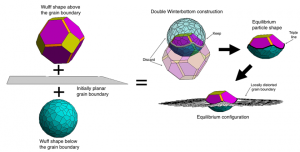
The open-source code, WulffMaker, is available as a Wolfram computable document format file or a Mathematica notebook.
Image: MIT/Rachel Zucker
Recent PhD recipient and past ECS student member, Rachel Zucker, examined one of the most complex issues in materials science and has developed a range of mathematical solutions to explain the phenomena known as “dewetting” in solid films. In defense of her thesis, Zucker modeled dewetting in microscale and nanoscale thin films.
Dewetting can be boiled down to the general break-up of material due to excess surface energy. Zucker’s development provides us with not only a new understanding of this phenomenon, but also a way to simulate it. When analyzing solid state dewetting, issues becomes very prominent as engineers attempt to make products with smaller and smaller features.
“The big takeaway is: One, we can write down formulation of this problem; two, we can implement a numerical method to construct the solutions; three, we can make a direct comparison to experiments; and that strikes me as what a thesis should be — the complete thing — formulation, solution, comparison, conclusion,” said W. Craig Carter, MIT professor and Zucker’s co-adviser.

